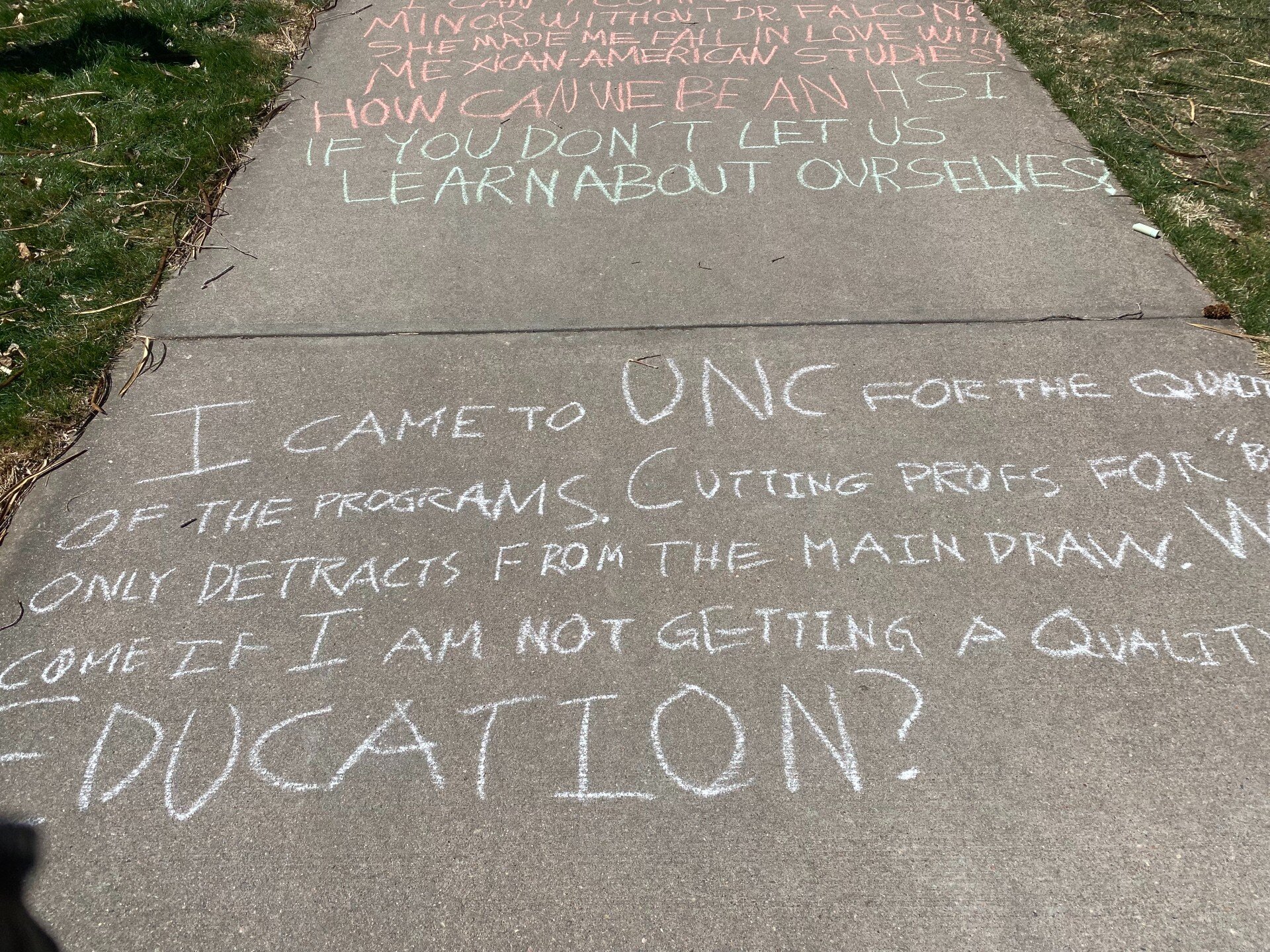University of Northern Colorado students rally for better transparency following program cuts

GREELEY, Colo. — When Maddie Smoker’s parents kicked her out of the house after she came out as gay, she turned to her professors at the University of Northern Colorado for support.
As graduation looms for Smoker, a senior majoring in history and anthropology, she is unsure which family members will attend her ceremony, but knows her professors will be clapping and cheering for her in lieu of unaccepting family members.
“This is my found family,” Smoker said in an interview with Rocky Mountain PBS.
Because those professors mean so much to her, Smoker joined a group of about 50 students at the University of Northern Colorado to protest recent changes in the school’s programs.
The university chose not to renew contracts for six contract-renewable instructors, effectively leaving those instructors without a job. Additionally, school administrators opted to close the European languages and cultures, French, and German programs from its course catalog.
Deanna Herbert, a university spokesperson, said the changes were necessary to diversify the university’s academic offerings, as well as keep up with declining enrollment numbers in those programs and increasing enrollment in others.
“Changing and diversifying our academic profile is necessary to our relevance and longevity as an institution of higher education,” Herbert wrote in an email to Rocky Mountain PBS. “Those changes can be difficult, particularly when they directly affect people who our students have come to know and trust in the classroom. But as a public university, we have the responsibility to ensure that we adjust our resources to meet student demand and maintain academic quality.”

Herbert said eight students are currently enrolled in those programs, and each of the eight will be given alternative courses to meet their graduation requirements.
But for the eight students in those programs and others in humanities and social science majors, cutting those language courses represents what they see as a larger problem: universities not valuing humanities and social sciences as much as they do other, often more lucrative, fields.
“The humanities and social sciences are where people truly find acceptance on this campus,” said Pamela Faulconer, a junior studying anthropology. “For a lot of queer students, gender nonconforming students, people of various sexual identities, people of color, people with neurodivergency and disabilities, this is where they find their home.”
Faulconer said these programs are more important now than ever because political tensions have made marginalized students feel even more alienated, and these programs give them a place to connect with one another.
“A lot of these students are finding their community within the humanities, and the humanities are what's being targeted,” Faulconer said.
Students and faculty involved in the rally also pleaded with administrators for more transparency around the decision. The announcement to cut certain language programs came just days after students and staff were told that the university had just had its best financial year in history, said Patricia Jolly, a senior lecturer in the anthropology department.
“So many students feel betrayed and erased,” Jolly said. “We are here because a lot of these decisions were made without transparency.”
Jolly said she and other instructors are demanding answers as to how decisions were made. Still, Jolly told students she was confident that the university's president, Andrew Feinstein, had the university’s best interest at heart and would work to find a solution.

“I have absolute confidence with the courage students have had to continue sharing what they need,” Jolly said. “I believe that he really does care about us.”
Feinstein spoke with students at the Friday rally and read the chalked messages they wrote on the sidewalks around the university, though he declined to answer questions from various media outlets.
Student organizers also said they were hopeful about the passion behind the issue. What started as a group of six students and faculty has grown to a Facebook group with 305 members and a rally of nearly 50.
While the group is working to solve the issues on their specific campus, organizers said the conversation is part of a larger national dialogue they hope to spark.
“Every school I know is dealing with this in higher education,” Jolly said. “We are kind of idealistic, we want to solve it so well that we can spark a national conversation.”
Alison Berg is a multimedia journalist at Rocky Mountain PBS. You can reach her at alisonberg@rmpbs.org.
